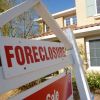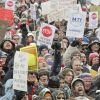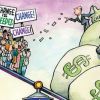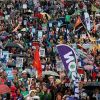-
 +13 +1
+13 +1The great middle-class identity crisis -We are not our jobs
We are what we do. We choose professions that suit our identity, and then those professions enhance our identity.
-
 +14 +1
+14 +1The Middle Class Is Steadily Eroding. Just Ask the Business World.
As politicians and pundits in Washington continue to spar over whether economic inequality is in fact deepening, in corporate America there really is no debate at all. The post-recession reality is that the customer base for businesses that appeal to the middle class is shrinking as the top tier pulls even further away.
-
 +19 +1
+19 +1More Americans see middle class status slipping
A sense of belonging to the middle class occupies a cherished place in America. It conjures images of self-sufficient people with stable jobs and pleasant homes working toward prosperity. Yet nearly five years after the Great Recession ended, more people are coming to the painful realization that they're no longer part of it.
-
 +21 +1
+21 +1The American Dream is out of reach
The American Dream is impossible to achieve in this country. So say nearly 6 in 10 people who responded to CNNMoney's American Dream Poll, conducted by ORC International. They feel the dream - however they define it - is out of reach.
-
 +20 +1
+20 +1The middle class is poorer today than it was in 1989
No wonder people are still so gloomy: the recovery hasn't one at all for middle class wealth.
-
 +16 +1
+16 +1Where the Middle Class Is Shrinking
The percentage of families earning middle-class incomes fell in nearly nine out of 10 major metro areas across the country between 2000 and 2014, according to new research by the Pew Research Center. The study defined middle-class households as those making between two-thirds and twice the national median income. That was roughly $42,000 to $125,000 a year for a family of three in 2014, though adjustments were also made for the cost of living in different areas.
-
 +16 +1
+16 +1Middle class incomes had their fastest growth on record last year
Middle-class Americans and the poor enjoyed their best year of economic improvement in decades in 2015, the Census Bureau reported Tuesday, a spike that broke a years-long streak of disappointment for American workers but did not fully repair the damage inflicted by the Great Recession. Real median household income was $56,500 in 2015, the bureau reported, up from $53,700 in 2014. That 5.2 percent increase was the largest, in percentage terms, recorded by the bureau since it began tracking median income statistics in the 1960s.
-
 +21 +1
+21 +1The decline of the middle class is causing even more economic damage than we realized
I have just come across an International Monetary Fund working paper on income polarization in the United States that makes an important contribution to the secular stagnation debate. The authors — Ali Alichi, Kory Kantenga and Juan Solé — use standard econometric techniques to estimate the impact of declines in middle class incomes on total consumer spending. They find that polarization has reduced consumer spending by more than 3 percent or about $400 billion annually. If these findings stand up to scrutiny, they deserve to have a policy impact.
-
 +22 +1
+22 +1The Demonisation of the Working-Class Shames Our Nation
Something very nasty is happening. A group of people, the most exploited within our society, are under attack. Their marginalisation has been going on for years. But it has accelerated disturbingly since 23 June. Few among the political class really understand them. These people live in modest homes in the grittier parts of the country. They work in factories, call centres and on building sites, often for low wages. They like football and watch Coronation Street. They sometimes hold old-fashioned views around things such as religion, family and nationhood. Some of them drive white vans.
-
 +37 +1
+37 +1Democrats, Trump, and the Ongoing, Dangerous Refusal to Learn the Lesson of Brexit
The parallels between the U.K.’s shocking approval of the Brexit referendum in June and the U.S.’ even more shocking election of Donald Trump as president last night are overwhelming. Elites (outside of populist right-wing circles) aggressively unified across ideological lines in opposition to both. Supporters of Brexit and Trump were continually maligned by the dominant media...
-
 +27 +1
+27 +1A Job Is More Than a Paycheck
In the aftermath of the 2016 presidential election, I’m starting to rethink one of my basic beliefs about the economy. For a long time, I’ve believed that what mattered most for economic well-being was money. Median income, consumption, wages -- all the things I cared about most were measured in dollars. Because of this attitude, I’ve supported lots of policies aimed at boosting the amount of money in the average person’s pocket.
-
 +31 +1
+31 +1How to Kill the Middle Class
Strangling public-sector unions in Wisconsin has shrunk teachers’ pay and benefits. Who’s next?
-
 +25 +1
+25 +1Barely Half of 30-Year-Olds Earn More Than Their Parents
Barely half of 30-year-olds earn more than their parents did at a similar age, a research team found, an enormous decline from the early 1970s. Even rapid economic growth won’t do much to reverse the trend.
-
 +43 +1
+43 +1Is Universal Basic Income a Good Idea? Stick Around, Because We're About to Find out
Upcoming UBI programs in Canada, Finland, Uganda, and other countries are very likely to tip the scales in the universal basic income debate one way or the other in 2017. Whether or not UBI is it, we need to find a solution to the problems that are inevitable as automation and AI replace human workers in the coming years.
-
 +44 +1
+44 +1The Year in Housing: The Middle Class Can’t Afford to Live in Cities Anymore
Cities are increasingly populated by lower-income people in subsidized housing and high income people prepared to pay $3,500 a month for a one-bedroom.
-
 +24 +1
+24 +1Any way you calculate it, income inequality is getting worse
A flurry of new reports have provided yet more data demonstrating that inequality is getting worse. All right, this does not qualify as a shock. But it really isn’t your imagination. The economic crisis, nearly a decade on now, has been global in scope — working people most everywhere continue to suffer while the one percent are doing just fine. One measure of this is wages.
-
 +33 +1
+33 +1U.S. income inequality, on rise for decades, is now highest since 1928
President Obama took on a topic yesterday that most Americans don’t like to talk about much: inequality. There are a lot of ways to measure economic inequality (and we’ll be discussing more on Fact Tank), but one basic approach is to look at how much income flows to groups at different steps on the economic ladder. Emmanuel Saez, an economics professor at UC-Berkeley, has been doing just that for years. And according to his research, U.S. income inequality has been increasing steadily since the 1970s, and now has reached levels not seen since 1928.
-
 +23 +1
+23 +1Is the American Dream Really Dead?
Just a few decades ago, more than 90 percent of 30-year-olds earned more than their parents had earned at the same age. Now it’s only about 50 percent. What happened — and what can be done about it?
-
 +29 +1
+29 +1In Unity is Strength
Trade unions have been demonized, demoralised and weakened by successive governments. In a time of immense economic inequality, Trade Union Congress leader, Frances O’Grady, is correct when saying “never has a strong, responsible trade union movement been so needed.” We live in an age of plentiful resources, yet these resources aren’t being shared, instead the super-rich are able to hoard wealth. In the past, unions metered this by bartering for higher wages and using their power to achieve change that benefited the working and middle class, such as equal pay, maternity pay, and health and safety laws.
-
 +36 +1
+36 +1Tax Cuts Don't Lead to Economic Growth, a New 65-Year Study Finds
Here's a brief economic history of the last quarter-century in taxes and growth. In 1990, President George H. W. Bush raised taxes, and GDP growth increased over the next five years. In 1993, President Bill Clinton raised the top marginal tax rate, and GDP growth increased over the next five years. In 2001 and 2003, President Bush cut taxes, and we faced a disappointing expansion followed by a Great Recession. Does this story prove that raising taxes helps GDP? No. Does it prove that cutting taxes hurts GDP? No.
Submit a link
Start a discussion




















